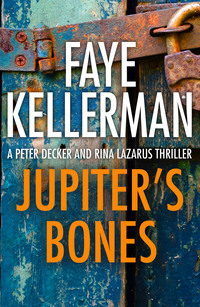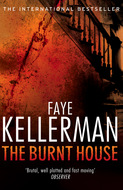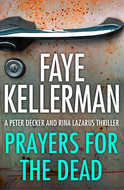Das Buch kann nicht als Datei heruntergeladen werden, kann aber in unserer App oder online auf der Website gelesen werden.
Buch lesen: "Jupiter’s Bones"
Jupiter’s Bones
Faye Kellerman

Copyright
Published by HarperCollinsPublishers Ltd
1 London Bridge Street
London SE1 9GF
First published in the United States by William Morrow, an imprint of HarperCollinsPublishers, 1999
This ebook edition published by HarperCollinsPublishers 2019
Copyright © Faye Kellerman 1999
Cover design © HarperCollinsPublishers Ltd 2018
Cover photography © Shutterstock.com
Faye Kellerman asserts the moral right to be identified as the author of this work.
A catalogue copy of this book is available from the British Library.
This novel is entirely a work of fiction. The names, characters and incidents portrayed in it are the work of the author’s imagination. Any resemblance to actual persons, living or dead, events or localities is entirely coincidental.
All rights reserved under International and Pan-American Copyright Conventions. By payment of the required fees, you have been granted the non-exclusive, non-transferable right to access and read the text of this e-book on screen. No part of this text may be reproduced, transmitted, down-loaded, decompiled, reverse engineered, or stored in or introduced into any information storage and retrieval system, in any form or by any means, whether electronic or mechanical, now known or hereinafter invented, without the express written permission of HarperCollins.
Ebook Edition © March 2019 ISBN: 9780008293581
Version: 2018-12-07
Dedication
For those who have made it worthwhile
to get up in the morning.
To Jesse for the projects and excitement.
To Rachel for the elegance and style.
To Ilana for the fun and games.
To Aliza for the snuggles and the warmth.
To Anne, my mother,
for the unconditional support.
To Barney, the suffering agent,
for the twenty-four-hour ear.
And to Jonathan—my partner in crime
as well as love.
Special thanks to
Special Agent Gayle Jacobs
for giving me a clue.
Any mistakes are mine, not hers.
Contents
Cover
Title Page
Copyright
Dedication
Prologue
Chapter 1
Chapter 2
Chapter 3
Chapter 4
Chapter 5
Chapter 6
Chapter 7
Chapter 8
Chapter 9
Chapter 10
Chapter 11
Chapter 12
Chapter 13
Chapter 14
Chapter 15
Chapter 16
Chapter 17
Chapter 18
Chapter 19
Chapter 20
Chapter 21
Chapter 22
Chapter 23
Chapter 24
Chapter 25
Chapter 26
Chapter 27
Chapter 28
Chapter 29
Chapter 30
Chapter 31
Chapter 32
Chapter 33
Chapter 34
Chapter 35
Chapter 36
Chapter 37
Chapter 38
Keep Reading
About the Author
Faye Kellerman booklist
About the Publisher
 Prologue
Prologue
Because her recent days had been filled with scientific data and research, Europa had paused only for the most basic of human necessities—food, water, bathroom breaks. Her nights had been equally jammed as she tried desperately to play catch-up—exercising on the stationary cycle, calling friends and attempting a life. Time had taken on a pace as unstoppable as the biblical flood. The rushing tempo had given her sporadic anxiety attacks as well as migratory bouts of heart palpitation—unusual since she was in peak condition and excellent health. She’d probably live a long time, judging by her parents’ genetics. Her mother had been in her early sixties when she had died, but she had been a broken woman.
Unlike her father.
Her father. He’d be in his seventies. And like most narcissists, he’d probably be in wonderful health.
Or so she thought.
But no time for any musings. Her professional calendar had been too demanding.
Except there had been that recurring daydream, a fragment from her past, a sneaky little devil that kept insinuating itself into Europa’s brain when she least expected it.
A remembrance of things past, thank you, Proust.
Sitting by the lake, watching the water gently lap up on the shoreline. For her tenth birthday, her father had decided to take her camping—just the two of them, leaving her squalling younger brothers at home with Mom. Dad had taken her somewhere up in the San Bernardino Mountains. To this day, Europa wasn’t sure of the precise location, and after she had become estranged from her father, she hadn’t bothered to ask.
The moment to remember had been at night. Back then, the stars weren’t subjects of scientific scrutiny nor were they inanimate objects of cosmological theory. They were millions of diamonds set into a velvet sky. The moon had been out—a waning moon, Europa recalled that. Its beams had bounced and rolled along the caressing waves. They had just finished a trout dinner cooked on the campfire … roasted marshmallows for dessert. Snuggling under her sleeping blanket with her father by her side.
Just the two of them.
When her father had been the most important person in her life.
To help her fall asleep, he had told her stories, something he rarely did. Tales of evil empires in faraway places called black holes. There were also the heroic, fleet-footed knights of Quasar. And when demons of black holes tried to capture the knights of Quasar with their secret destructive weapon called gravity, the knights would turn themselves into invisible, weightless rays, and escape faster than the speed of light.
A fantastic story because her science teacher had told them that nothing traveled faster than the speed of light. And when she had mentioned that fact to her father, he had laughed, then kissed her cheek. The only time in her life when Europa remembered being the recipient of her father’s affection. Not that Dad had been overtly cruel, just inconsiderate. But mostly absent.
She thought of that night when she received the news—that her father was not only dead, but had died under suspicious circumstances.
 1
1
“The thing is, they moved the body, Lieutenant.”
“What?” Decker strained to hear Oliver’s voice over the unmarked’s radio static. “Who’s they?”
“Whoever’s acting as the head honcho of the Order, I guess. Marge did manage to seal off the bedroom. That’s where Jupiter was found—”
“Could you talk up, Scott?”
“—point being that the crime scene is screwed up, and the body has been messed with because of the shrine.”
“Shrine?”
“Yeah. When we got here, the members were in the process of dressing him and constructing this shrine—”
“Where’s the body now?”
“In a small anteroom off some kind of church—”
Temple, Decker heard a male voice enunciate from the background. “Someone with you, Detective?”
“Hold on, lemme …”
Decker tapped the steering wheel until Scott came back on the line. It took a while.
Oliver held his voice low. “I told them to stop messing with the corpse until you got here. Not being a trusting soul, I’ve been guarding the body with some self-appointed guru who calls himself Brother Pluto. I sent an officer in there to keep him company so we could talk more privately.”
The electronic noise cracked through Decker’s ear. He said, “You need to talk louder.”
Oliver spoke up. “This Pluto person doesn’t want the police here. He keeps insisting that the death was natural, waving this bogus death certificate to prove it, disregarding the empty fifth of Stoli underneath the bed. Which he claims wasn’t Jupiter’s because Jupiter didn’t drink.”
“Death certificate?” Decker said. “Has the coroner been there?”
“Nope. It was signed by a gent named Brother Nova.”
“Who’s he?”
“Got me, sir.”
“Did you explain to them what we’re doing is standard procedure in sudden deaths?”
“I’ve tried to explain it, but Pluto’s not listening.” A laugh. “I’ve been biting my tongue, refraining from asking him where Goofy was.”
Decker smiled. Oliver was showing unusual discretion. “Did you tell him that we have to transport the body to the morgue for autopsy?”
“Been saving the good news for you. Because right now, Pluto and his toons are not happy campers, though I suspect they’ve never been a cheerful lot. Who called the death in?”
“Jupiter’s daughter. Her name is Europa Ganz. She’s on the faculty at Southwest University of Technology. Jupiter used to be a hotshot professor there years ago. His real name is Emil Euler Ganz. Apparently, the daughter’s not associated with the Order.”
“So how’d she find out about the death?”
A good question. “I don’t know, Scott. The details are sketchy.” He hesitated. “Find out about Ganz’s death certificate. This Nova must be a member of the Order, right?”
“I’d assume so. Probably some kind of in-house doctor. But that doesn’t qualify him to sign off on Jupiter.”
True enough. Decker’s finely tuned psycho-BS-detector was on max. He said, “The static is really bad. I’m having trouble hearing you. Just keep status quo until I get there.”
“We’re trying. But the parishioners are getting feisty. Is ‘parishioners’ the right word?”
It was fine with Decker although cult followers seemed more apropos. “Just try to keep everyone quiet.”
“How far are you from the holy spot?”
“Four, five miles. Traffic’s a little thick. I’ll be there in about fifteen minutes.”
“See you.” Oliver clicked off.
The initial call had come through while Decker was still home, eating breakfast with his younger daughter, who was as skinny as the stick figures she drew. Hannah thought it was great fun to pick the raisins from her oatmeal, leaving behind the grainy mush. Decker was trying to spoon-feed her, attempting to get some nutrition down her gullet until Rina aptly pointed out that the child was five, and capable of feeding herself.
He lived about twenty minutes by freeway from the station house, about thirty-five minutes from the crime scene. That was on good days, and today wasn’t one of them. Decker ran his left hand through strands of ginger hair now streaked with white, and settled into the seat of the unmarked Buick. He guzzled strong coffee from a thermos. Across the passenger’s seat was the front page of the Los Angeles Times.
Eight-oh-five and nothing was moving.
Inching his way up to the next off-ramp, he decided to exit and take Devonshire. The boulevard was one of the main east-west arteries through the San Fernando Valley, six lanes lined with strip malls, wholesalers and industrial warehouses. Going farther west, the street’s industry gave way to residences—stucco ranch houses sitting on flat land that once held agricultural orchards—oranges, lemons, apricots. He and Rina had recently purchased a house in the area, intending to move in after a few minor renovations.
Which had turned (predictably) into a major overhaul.
He could have done the job himself if he hadn’t been gainfully employed. So they bit the bullet, hiring subs while Rina acted as the contractor. One day, Decker had come to the property to find his wife precariously balanced on a ladder, pointing out to the roofer a defect near the chimney. Her skirt blew in the wind as she spoke animatedly, though Decker couldn’t hear a word of the conversation. Apparently the roofer had run the hose over the top of the house for twenty minutes, proudly pronouncing the place water-tight. But Rina had been skeptical. She had run the hose for three hours, discovering a leak after two hours and twenty minutes.
(The first rain would have ruined the hardwood floors, Peter.)
Decker smiled, thinking about her image—that of his Orthodox Jewish wife perched on the highest rung of a tall ladder, one hand pointing out flaws while the other held down that hat she wore to cover her hair.
The scene helped to buoy his spirits. The day was gray and dirty, typical overcast May weather in Los Angeles. At least the cars were moving. He proceeded west into open terrain, the foothills on the right greened by the recent rains. They had become rolling waves of wild grass and flowers, spewing their pollens, making it a miserable allergy season. What Decker wouldn’t have given to have the Allegra concession this year.
He thought about Europa Ganz’s call to headquarters—reported as a suspicious death. In this case meaning suicide as opposed to death by natural causes. How could she know anything if she wasn’t there?
Someone tipped her. Who? And why?
Decker found suicides annoying because everything was left pending until the coroner made a definitive ruling. In the meantime, Homicide was saddled with the unpleasant job of keeping everything and everyone on hold, plus preserving the integrity of the “crime” scene—just in case. If Ganz had been someone less noteworthy, Decker wouldn’t have been called down. But since the corpse had once been a luminary prizewinner in astrophysics—a visionary for his generation eons ago—as well as the current leader of a two-hundred-plus-person enclave, Strapp thought it a good idea for someone with a title to make an appearance. The captain would have come in person, except he’d had a morning meeting downtown.
From what Scott Oliver had said over the radio, the members of the Order of the Rings of God were griping about the police. Of course, they’d gripe about anything establishment. Decker had been inside the compound once. It was not the stark and sterile place he had imagined. The interior had high ceilings with lots of skylights—blueness and sunshine visible from all angles. A complete view of the heavens, as if Ganz hadn’t quite given up cosmology.
Lots of skylights, several gable vents, but very few windows.
Decker had been called out to investigate a kidnapping charge, which turned out to be another case of a wayward kid exchanging the complexities of freedom for straightforward rules and regulations. He hadn’t talked to Ganz. Instead, he had been given some underling with a celestial name. (Had it been Pluto?) The sect member had insisted that no one was ever held against his or her will.
He seemed to speak the truth. He had allowed Decker inside the entry hall to interview the kid. Clearly, the boy had wanted to be there. Although Decker’s heart went out to the parents, he was hog-tied. Their son was over eighteen and legally—if not emotionally—an adult.
Looking into his rearview mirror, Decker saw the meat wagon about thirty feet behind him. He led the way to the compound. Together, they pulled up curbside, parked and got out.
The Order of the Rings of God had placed itself on five acres of flat land blending into mountainside. The structure was a series of square, gray stucco bunkers linked together chock-a-block. From this view, Decker could see the tops of the skylights peeking out from the roofs. And his memory had served him correctly. There were very few windows—small, square panes more suitable for an attic. The domain was enclosed by a six-foot chain-link fence. A pack of Doberman pinschers had materialized, greeting them with vicious snarls.
The driver of the van wore blue scrubs. His name tag called him Postham. With him was the deputy coroner, Dr. Judy Little, a misnomer because she stood about five-ten and weighed around 175. She reminded Decker of Marge, both of them being large-boned, attractive and in their mid-thirties. But Marge’s eyes were softer, brown and doelike. They were one of her best features.
Postham squinted into the glare of the steely sky. Judy Little growled back at the dogs, which made them bark louder. “I don’t envy the mailman. Where’s the gate? Surely they don’t expect us to drive around the entire perimeter.”
Decker picked up his mobile phone and called Oliver. “How do we get in?”
“Where are you?”
“In front, being sized up by a trio of maniacal Dobies. Have someone come out here and direct us.” Decker punched the end button, regarded the stucco cubes. From his perspective, he could see seven.
“A real architectural masterpiece.” Little had to shout to be heard over the dogs. “What’s the style? Neo-Cult military?”
“Squares are the way to get the most space for the least money.”
“May be practical, but no aesthetics.”
“Agreed.”
Little said, “Got any background for me?”
Decker tried to stare down the dogs. No success. “Call came into headquarters as a suspicious death. Detective Oliver found an empty fifth of vodka under the victim’s bed. I’m thinking like a Heaven’s Gate suicide—a combination of drugs and liquor. The victim was Dr. Emil Euler Ganz. He was once a big wheel in academic physics. Then he suddenly disappeared for ten years. When he finally showed up, he had reinvented himself as Father Jupiter. He’s been running the Order for fifteen years.”
Little screamed at the dogs to shut up. They didn’t listen. “Oh. Him. So you think he left this galaxy to ascend to a better universe? Well, good luck to him. I wonder if he took anyone with him?”
The thought made Decker shudder. “We’ve only found the one body.” He waited a beat. “It’s a good point.”
“What is?”
“Ganz’s taking his disciples with him. Maybe he left some instructions for them to join him. Even if he didn’t, there’re bound to be a few unbalanced individuals in there who could play follow the leader.”
“A few unbalanced individuals?”
Decker raised his eyebrows. “Look, if adults inside want to kill themselves, I’d try to stop them, but you can’t save the world. In this case, though, there’re kids involved. That concerns me.”
Little made a face. “Now that’s a very good point.”
Decker rubbed his forehead, wondering how he could possibly ensure the kids’ collective safety. As always, responsibility weighed him down, much more than his two-hundred-plus poundage.
A silver van was approaching from the other side of the fence. When it stopped, a girl of around twenty stuck her head out. No makeup or jewelry. She had a heart-shaped face and a smooth complexion. Her murky pond-colored eyes were swollen, her nose was red and drippy. Her hair was tied up in a bun and covered by a white, crocheted net. She wiped her nostrils with a tissue and said, “How many more of you are coming down?”
“Pardon?” Decker asked.
“Police,” she sneered. “How much longer must we put up with this invasion of our cherished privacy? What we do is no one’s business but our own.”
Decker didn’t speak for a moment, letting the silence hang in the air. Pausing always helped him to deflect anger and control his tongue. Finally, he said, “Ma’am, are you supposed to direct us to the compound’s entrance?”
“I am not Ma’am! I am Terra!”
“Okay,” Decker answered. “Terra! Are you supposed to direct us to the compound’s entrance?”
She nodded. “Yes, I am.”
Decker opened his car door. “So why don’t you do just that?”
 2
2
Ignoring hostility was part of the profession. Decker was used to stony glares and the occasional hurled epithet. But there was something disconcerting about the group. So many disciples, all of them displaying a curious mixture of fury and fragility. Or maybe it was the white cotton robes they wore, making them look like zombies housed in shrouds.
He thought a moment.
That wasn’t fair. Jews also wore white robes—kittles. Men wore them when they married, during the High Holy Days, and at the seder—the festive Passover meal. The garment was also used in burial. A morbid association, but Decker couldn’t help thinking about it.
Most of the sect members simply stared as Decker, along with Oliver, draped the yellow crime tape across the temple door.
Brother Pluto, on the other hand, expressed himself verbally. “Is that yellow ribbon really necessary, or are you two just looking for something to do until that doctor is done?”
He was thin and short and balding. He also wore a robe, but his was blue and appeared to be fashioned from silk. He had a belt on it, but it was partially open. Underneath, Pluto wore a white T-shirt and jeans. The acting head guru was irritated. He spoke in a reedy voice. If Decker were to personify him as a planet, Pluto would have been the logical choice.
Decker finished pinning the tape and straightened his back, towering over the little man. “Sorry about spreading the investigation all over the place. Since the body was moved, we can’t confine ourselves to just the one room—”
“A clear violation of our civil rights!”
Decker smoothed his mustache, then said, “Tell me whose civil rights are being violated and I’ll put a stop to it!”
Pluto spoke bombastically. “You know what I mean! Your people questioning our grieving family.”
Oliver ran his hands through his black hair, wondering if the guy really was an alien. He sure as hell looked like one. “We’re trying to find out what happened to your leader, sir. Don’t you want to know?”
“But we do know, Detective! Our Father Jupiter has gone to a better place.”
So why all the grieving? Decker glanced upward at a peaked skylight of stained glass—swirls of blue, yellow and orange. It looked like something Van Gogh would have designed. Huge mother. It was supported by beams of steel and wire mesh.
He returned his eyes to Pluto and said, “Spiritually, I’m sure you’re right, sir. Unfortunately, we need to know what happened physically—”
“Spiritual and physical are one and the same. Of course, the violators will never understand that. Society’s thinking has been fractured irreparably, constantly separating the soul and body. Just as you’ve done now, Lieutenant. It’s not your fault, though. You’ve just never been schooled.”
Decker said, “Perhaps, at another time, you can enlighten me.”
“You’re being sarcastic. Your attitude is typical for a violator. Even more in sync with your work as a policing agent.”
Pluto’s vitriolic words had drawn a little crowd. It was growing by the moment.
Now what was the friggin’ purpose of all that? But of course, Decker knew the purpose. To embarrass him, to make the outsider—the violator—look like the ignorant fool. Still, he held his tongue. He wasn’t about to start a riot for what appeared to be an open-and-shut case of suicide.
“I’m not trying to be contentious. Just curious. If I were an outsider interested in joining the Order, how would you explain to me the true nature of the universe?”
Pluto sneered. “Our philosophy is not a parlor game, Lieutenant!”
“I didn’t say it was. Tell me your philosophy. And if we have time, I’ll spout off a few theories of my own.”
Pluto seemed amused. Folding his arms across his chest, he leaned against the temple door, breaking the crime ribbon. “Very well. We’ll trade philosophies. But you two go first—”
Oliver’s brown eyes darted across the masses. He held his hands up. “Hey, leave me out of this one.”
“As you wish.” Pluto turned to Decker. “Lieutenant.”
Spitting out the title as if it were a swear word.
Decker picked up the yellow tape and tacked it back onto the door, aware that the gathering was waiting for him to begin. “Interesting that you should mention the universe. Because I remember reading one of Ganz’s—”
“Father Jupiter,” Pluto interrupted.
“Excuse me.” Decker was deferential. “I was reading Father Jupiter’s lay articles on the universe … back when he was a cosmologist.”
Like Pluto, Decker knew he was playing to an audience. He divided his glances between the cotton-robed followers and the silk-robed Pluto.
“As an observant Jew, I was struck by one of Jupiter’s statements—that the universe has neither a past nor a future. It was something that just was … or is. Sort of flies in the face of the Big Bang theory—”
“The Big Bang?” Oliver smiled. “I like the sound of this theory.”
Decker held back laughter. “It stated that the universe came from one massive explosion.”
“Explosion of what?”
“An explosion of … stuff.”
“How’d the stuff get there?”
“That’s an open question,” Decker answered.
Pluto broke in. “It’s not the universe that always was. It’s matter in the universe that was, is and always will be. The physical component of course explains nothing about the spiritual.”
“Agreed. Which is why we Jews have kind of combined the two aspects. We believe that God—whom we call Hashem, which means the name in Hebrew—is the source of all matter and is neither a creation nor susceptible to destruction. Hashem just is. God is material and God is spiritual. And He described His heavens as limitless way before science got into the act.”
Pluto continued to slouch with his arms across his chest. “Precisely why Father Jupiter left science and returned to the spiritual.” He waved a dismissive hand. “I don’t think you’ve said anything too profound about God’s existence. In fact it’s rather simplistic.”
Decker was winging it now. “Well, I was just thinking … now correct me if I’m wrong—if the universe or at least matter was, is and always will be, and if matter has existed forever … and all matter is conserved, then Jupiter’s still a part of the universe—”
“More simplicity—”
“So if your leader isn’t dead, just … transformed, then why grieve for him? Why the shrine? Why all this hoopla for someone who—as you stated—is in a better place? You shouldn’t be grieving. You should be having a party.”
Oliver added, “Yeah, like a wake or something. BYOB. Judging from the fifth under Jupiter’s bed, maybe your leader was doing just that.”
The crowd’s eyes went back to Pluto. The short man’s cheeks had taken on a deep blush. “Your cavalier attitude to our Father Jupiter the Beloved is obscene!”
Pluto turned on his heel and stomped off.
Oliver and Decker exchanged glances. Decker shrugged. No one spoke for a moment as the crowd stood shell-shocked in the absence of a leader. Decker cleared his throat. “I’m sure you’d like us out as soon as possible. And we’d like to give you back your privacy. So could you all please keep the aisles clear so we can conduct our business?”
No one moved.
Decker said, “Come on. Let’s break it up. Debate club is over.”
As if programmed, the people began to disperse. After the crowd had thinned, Oliver whispered, “Think the lobotomies are done before or after they join up?”
Decker smoothed his pumpkin mustache. “Some people just have a rough time coping.”
Oliver shook his head. “You did pretty good … being put on the spot like that.”
“I plagiarized from Rina. Actually, she made the connection between the universe and how Jews view God. We were watching some science yawner on PBS or the Discovery Channel … ‘Nova’ or ‘Omni’ or something with a short name.”
“You mean there are human beings who actually watch those shows?”
“Rina does. She likes that stuff. I don’t remember much. I fell asleep.” Decker looked up at the skylight. The gray overcast was beginning to burn off. “We pissed Brother Pluto off. That wasn’t smart. It’s going to make our job harder.”
“Loo, what exactly is our job?”
“To bring the body to the morgue for a complete autopsy. Once Dr. Little formally declares this a suicide, we can button this case up.”
“So let’s load the body into the meat wagon.”
Decker shook his head. “Not yet. Let me talk to the Doc. If she sees no overt sign of homicide, I’m inclined to let these guys have their shrine and their last good-byes.”
“Why? Let’s just get the hell out of here.”
“Patience. I’d like to give you and Marge more time to check out the bedroom. It would also give the people here some closure. Maybe make them feel a little less hostile toward us. And maybe that would mean fewer problems if we need to come back.”
“Body temperature hasn’t dropped much. I’d guestimate that he’s been dead for less than six hours. No rigor, but it was cool last night. If the room wasn’t heated, the lower temperature could have delayed its onset. Lividity was shot to hell because the body was moved.” Little consulted her notes. “No stab wound, no gunshot wounds, no overt bruises, contusions or ligature marks. Nothing to suggest foul play by brute force.” She leaned over the body. “But there are subtler ways of doing a guy in.”
Decker’s interest perked up. “Meaning?”
“He had a few puncture marks in his arm—the left bicep. A neat job. No evidence of hitting a vessel or a subdural hematoma. Just a tiny prick. See this little dot right here?”
“Sure do. Is it self-inflicted?”
“Possibly,” Little said. “He also had some punctures in his buttocks. Could be harmless, but I won’t know anything definitive until I get the bloods and gases back. I’m about done here … ready to take Professor Ganz to the chophouse—”
“Uh yeah, that might be a problem—”
“They don’t want to autopsy the body.”
“Exactly.”
“It’s the law.”
“Exactly.” Decker smoothed his mustache. “How much time before the body chemistry starts changing?”
“The sooner I get him in a meat locker, the better.”
“The folks here want to have some kind of processional, walk by the body to say good-bye to their leader.”
“How long?”






